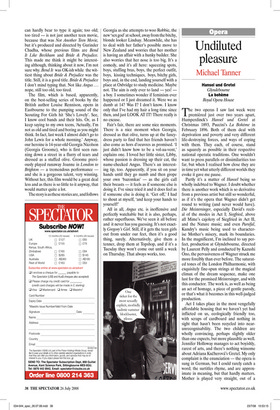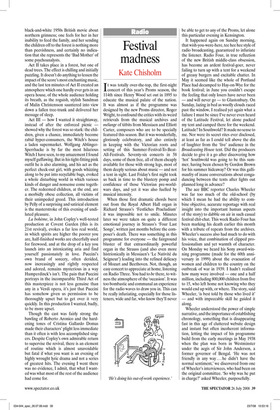Undiluted pleasure
Michael Tanner
Hansel und Gretel Glyndebourne La bohème
Royal Opera House The two operas I saw last week were premièred just over two years apart, Humperdinck’s Hansel und Gretel at Christmas 1893, Puccini’s La Bohème in February 1896. Both of them deal with deprivation and poverty and very different life-destroying forces, and ways of coping with them. They each, of course, stand as squarely as possible in their respective national operatic traditions. One wouldn’t want to press parallels or dissimilarities too far, but when I realised how close they are in time yet what utterly different worlds they evoke it gave me pause.
Partly it’s a matter of Hansel being so wholly indebted to Wagner. I doubt whether there is another work which is so derivative from a previous artist but still so wonderful, as if it’s the opera that Wagner didn’t get round to writing (and never would have). Die Meistersinger, especially David’s recital of the modes in Act I; Siegfried, above all Mime’s cajolery of Siegfried in Act II, and the Nature music; and even Parsifal, Kundry’s music being used to characterise Mother’s misery, mark its boundaries. In the magnificent, I’m inclined to say perfect, production at Glyndebourne, directed by Laurent Pelly and conducted by Kazushi Ono, the pervasiveness of Wagner struck me more forcibly than ever before. The saturated tones of the London Philharmonic, with exquisitely fine-spun strings at the magical climax of the dream sequence, make one lust for the promised Meistersinger, and with this conductor. The work is, as well as being an act of homage, a piece of gentle parody, or that’s what it becomes in this well-judged production.
Act I takes place in the most vengefully affordable housing that we haven’t yet had inflicted on us, ecologically friendly too, with scraps of cardboard and nothing in sight that hasn’t been recycled into nearunrecognisability. The two children are wholly convincing, perhaps slightly older than one expects, but more plausible as well. Jennifer Holloway manages to act boyishly, rarest of arts, and there’s nothing winsome about Adriana Kučherová’s Gretel. My only complaint is the enunciation — the opera is sung in German, but I could rarely catch a word; the surtitles rhyme, and are approximate in meaning, but that hardly matters. Mother is played very straight, out of a black-and-white 1950s British movie about northern grimness; one feels for her in her inability to feed the family, and her sending the children off to the forest is nothing more than peevishness, and certainly no indication that she represents the ‘Bad Mother’ of some psychoanalysts.
Act II takes place in a forest, but one of dead trees. The effect is chilling and initially puzzling. It doesn’t do anything to lessen the impact of the score’s most enchanting music, and the last ten minutes of Act II created an atmosphere which one hardly ever gets in an opera house, of the whole audience holding its breath, as the roguish, stylish Sandman of Malin Christensson sauntered into view down a fallen tree-trunk and delivered her message of sleep.
Act III — how I wanted it straightaway, instead of after the enforced picnic — showed why the forest was so stark: the children, given a chance, immediately become rabid hyper-consumers, the Witch’s house a laden supermarket. Wolfgang AblingerSperrhacke is by far the most hilarious Witch I have seen, to my amazement I found myself guffawing. But in his tight-fitting pink outfit he is also alarming, and his act as the perfect check-out girl, with goods whizzing along to be put into recyclable bags, evoked a whole disturbing world in which various kinds of danger and nonsense come together. The redeemed children, at the end, are a morbidly obese collection, all victims of their unimpeded greed. This introduction by Pelly of a surprising and satirical element is the masterstroke of this evening of undiluted pleasure.
La bohème, in John Copley’s well-tested production at Covent Garden (this is its 21st revival), evokes a far less real world, in which spirits are higher the poorer you are, half-finished works are cheerfully used for firewood, and at the drop of a key you launch into an intoxicating aria and find yourself passionately in love. Puccini’s own brand of sorcery, often derided, now increasingly and rightly respected and adored, remains mysterious in a way Humperdinck’s isn’t. The pain that Puccini portrays in the incomparable Third Act of this masterpiece is not less genuine than any in a Verdi opera, it’s just that Puccini has somehow given us permission to be thoroughly upset but to get over it very quickly. In this production I wanted, badly, to be more upset.
Though the cast was fairly strong the bawling of Roberto Aronico and the hardening tones of Cristina Gallardo Domas made their characters’ plight less immediate than it often is with less accomplished singers. Despite Copley’s own admirable return to supervise the revival, there is an element of routine which is almost unavoidable but fatal if what you want is an evening of highly wrought lyric drama and not a series of greatest hits. The evening I went there was no evidence, I admit, that what I wanted was what most of the rest of the audience had come for.



























































 Previous page
Previous page